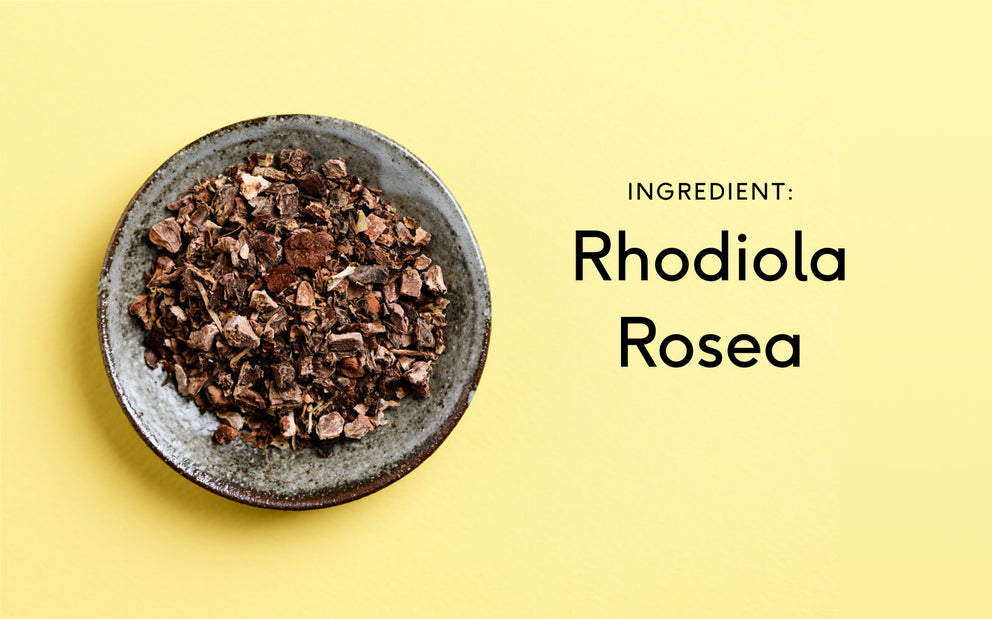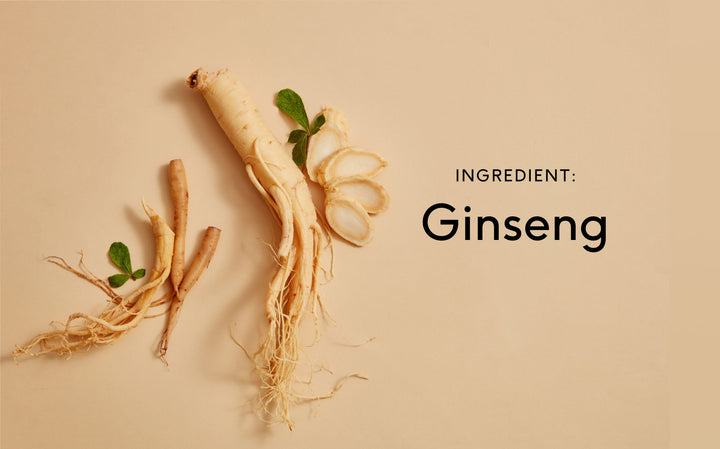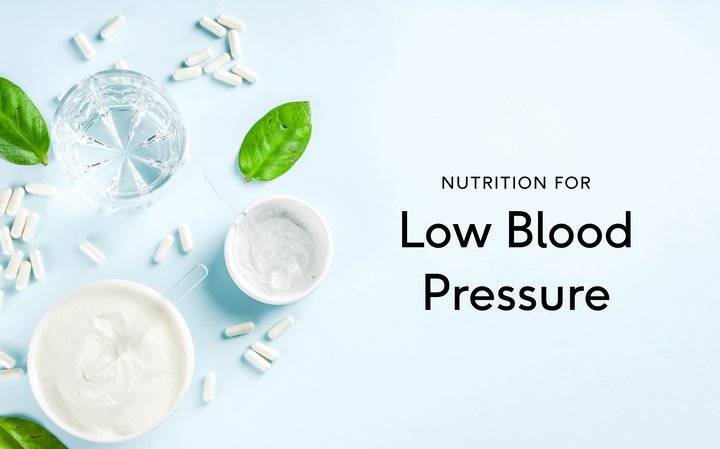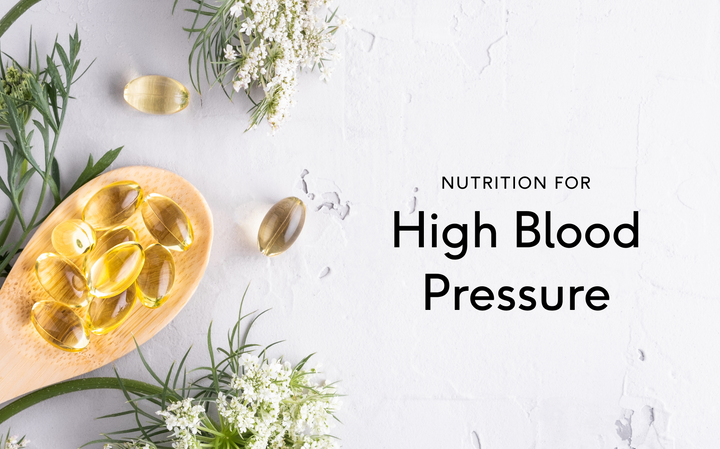What is Rhodiola Rosea: Benefits, Risks, How to use [2025 Nutritionist Reviewed]
Birte is a passionate nutrition therapist, creative cook, caring herbalist and supportive health coach.
Birte is a passionate nutrition therapist, creative cook, caring herbalist and supportive health coach.
Table of contents

| Ingredient name | Rhodiola Rosea |
|
The ingredient is also known as |
Golden root, Arctic root, King's crown, Orpin rose, Rose root, Rosewort, and Siberian Golden root1, 2, 3 |
| Available Rhodiola rosea forms |
Rhodiola supplements are available in the form of capsules, tablets, dried powder, and liquid extract1. |
| Possible bioavailability | Rosavin and Salidrosides are the two main active compounds. Salidroside is quickly absorbed into the blood. Rosavin has more limited bioavailability. Both reach blood peak levels after 2 hours and will wane after 5-8hrs4 |
| Water-soluble or fat-soluble | Many bioactive constituents that occur in Rhodiola rosea are water-soluble including Salidroside and Rosavin5 |
| Health benefits associated with Rhodiola rosea | Increased energy, reduced stress, increased physical endurance and athletic performance, and increased mental alertness6 |
| Year ingredient discovered | Early first century around 77AD and its use was first recorded by the Greek physician Dioscorides in De Materia Medica1, 7 |
| Rhodiola rosea mostly used in |
Traditional Chinese and Greek medicine, along with Asia, Russia, Eastern Europe and Nordic countries1 |
| Recommended dose | Varies between brands. The dose of Rhodiola can be 100-600mg a day2, 4 |
| Daily reference intake | N/A |
| Does the human body produce this ingredient | No |
| The half-life |
Around two hours4 |
| Signs of Rhodiola deficiency |
The body does not require this daily so there are no known incidences of deficiency8, 9. |
1. Overview: What is Rhodiola rosea?
Rhodiola rosea is a plant that grows in the cold parts of Europe and Asia. The root has a long history of use in traditional phytomedicine (herbal medicine)10. It is a herbal supplement with adaptogen properties11. Rhodiola has a long history of medicinal use in Russia, Scandinavia, and other parts of Europe. Traditionally, it was used to attempt to increase endurance, work performance, and tolerance of high altitudes and also to treat fatigue and weakness12. The health benefits of this herbal root are probably linked to its anti-inflammatory properties2.
2. What forms of Rhodiola rosea are there?
Rhodiola rosea is usually available in capsules or tablets that contain between 100-600mg. It is standardized to contain around 3 percent Rosavin’s and about 1 percent Salidroside2.
3. What is Rhodiola rosea made from?
Rhodiola is a perennial plant that grows in the US, Canada, Europe, and parts of Asia. Its root, also known as Golden root, is commonly used in traditional medicine as a herbal supplement making use of its adaptogen properties that help resistance to physical and mental stress11, 7. To obtain the medicinal compounds for use, the roots and rhizomes of the plant are dried and most commonly extracted by using alcohol3.
4. What does Rhodiola rosea do?
Rhodioloa rosea is an adaptogen. Adaptogens are a class of natural substances that are believed to enhance the body's resistance to physical, environmental, and emotional stressors. Panossian, A. et al 2010, reported that adaptogens exhibit neuroprotective, anti-fatigue, anti-depressive, anti-anxiety and nootropic effects and stimulate the nervous and immune systems13. Other benefits include, helping to protect cells from oxidative damage and helping regulate the heartbeat, increased endurance and performance, and helping with coping with high altitudes. It is also used to treat fatigue and weakness of chronic illness11,12, 7. There is some evidence to suggest it promotes fatty acids utilization and enhances antioxidant function14. Studies also show that Salidroside, one of the primary active compounds in Rhodiola, has beneficial effects on brain health and may inhibit the development of brain tumors.
5. What is the function of Rhodiola rosea supplements?
The protective activity of adaptogens such as Rhodiola occurs through several mechanisms, including the regulation of stress responses via the hypothalamic-pituitary-adrenal axis 3
Rhodiola rosea may have beneficial effects on cardiovascular function, the nervous system, cognitive function, and certain mental health conditions15. A systematic review in 2012 showed some evidence suggesting that the herb may be helpful in enhancing physical performance and alleviating mental fatigue16. A double-blind trial carried out in 2009 found Rhodiola extract lowers the heart rate during exercise and helps improve exercise performance8.
6. What is Rhodiola rosea used for?
A Comprehensive Review in Food Science and Food Safety published an article in 2006 that suggests Rhodiola rosea is an versatile adaptogen18. This means Rhodiola can help to increase the body's physical and mental resistance and normalize functions18. This finding was based on evidence from several smaller studies showing the plant’s extracts provide benefits for mental health and cardiovascular function2.
Rhodiola rosea may be suitable as an alternative treatment in psychiatric medicine for mild to moderate depression Study results indicate that Rhodiola rosea extracts may have therapeutic properties in for the treatment of binge eating disorder, generalized anxiety disorder, and depression19.
In a randomized control study that followed young, healthy people who took Rhodiola rosea extract daily for four weeks the results showed they had an increased level of endurance during exercise20, 1. It is also been found to reduce heart damage caused by the chemotherapy drug Epirubicin.
7. Is Rhodiola rosea effective?
As discussed above, Rhodiola rosea has multiple beneficial effects, including antioxidant, anti-cancer, cardioprotective properties and its ability to act on the nervous system. It may help increase the levels of neurotransmitters like serotonin, dopamine, and noradrenaline 21. There have been a number of clinical trials conducted on the benefits of Rhodiola rosea. Rhodiola is also known as a supplement part of a group of complementary natural supplements including Ginseng, Ashwangda, Creatine, and Gingko Biloba that help with enhancing cognitive performance20, 21.
The authors of a 2015 study concluded that Rhodiola may improve mental well-being and may be suitable as a treatment for mild to moderate depression. This study involved 57 people taking the herb for 12 weeks.
In a randomized, double-blind, placebo-controlled study on Rhodiola rosea for the treatment of stress-related fatigue, the extract SHR-5 was found to exert an anti-fatigue effect that increases mental performance, particularly the ability to concentrate, and decreases cortisol (stress hormone) and ‘burnout’ in patients with stress related fatigue8,. In terms of athletic performance, a small American study published in the Journal of Strength and Conditioning Research in 2013, found that people given Rhodiola before a time trial on a stationary bike pedalled faster, and felt less exhausted, than those who took a placebo23.
8. How to take Rhodiola rosea?
Rhodiola is usually available in capsules or tablets, sometimes as a powder, that usually contains 50-600 mg of a mixture of 3 percent Rosavin and 1 percent Salidroside. There are many other active compounds in Rhodiola. Some of these compounds have known benefits whilst the role of others is still unknown. Since most research has focused on Rosavin and Salidroside these would be the desired compounds to look out for in the supplement (SHR5 and WS1375)7. Rhodiola is given in doses of 50–600 mg per dose, usually taken two to three times per day7, 3.
Evidence suggests that people can take the herb on an empty stomach around 30 minutes before a meal. Even though Rhodiola may indirectly improve sleep by reducing stress, it is best to take Rhodiola in the first part of the day, away from sleep times 18 .
Note that as with all supplements it is best to seek medical advice from a healthcare professional before taking especially if you are taking other medications. Rhodiola rosea is not an approved treatment by the FDA (Food and Drug Administration) in the US and FDA has issued warnings to some manufacturers of dietary supplements containing Rhodiola rosea for making false health claims about its effectiveness.
9. How long does it take for Rhodiola rosea to work?
Rhodiola has been safely used in trials lasting 4-12 weeks during which time its benefits unfold/have been observed. In some cases these were notable from one week onwards. Rhodiola may exert its benefits much sooner than that but may only become apparent after supplementing for several days24.
10. How long does it take for your body to absorb Rhodiola rosea?
Salidroside is water-soluble and is normally absorbed in one hour and the half-life is approximately one hour. Rhodiola’s main constituents can be present in the body for at least four to six hours after ingestion and will likely be completely excreted within two to three days 17.
Benefits of Rhodiola Rosea:
- Improve low mood and reduce fatigue21
- Improve physical endurance20
- Improves concentration and mental performance8
- Reduces high cholesterol levels15
11. How much Rhodiola rosea do I need to take to feel the benefits?
Rhodiola is given in total doses of 50–600 mg, usually taken two to three times per day7
Taking Rhodiola twice a day for 6 to 12 weeks seems to be safe for most people as evidenced by clinical trials3.
12. What are the side effects of Rhodiola rosea?
Side effects reported from Rhodiola treatment include18:
- Dizziness
- Dry mouth
- Sleep problems
- Fidgeting
13. What are the signs of Rhodiola rosea deficiency?
There is no known Rhodiola rosea deficiency and it is not an essential nutrient for the body.
14. What are the risks associated and warnings with taking Rhodiola rosea?
Rhodiola has a mild stimulant-type effect and so is not recommended for people who have bipolar disorder or who are taking other stimulant substances18. Caution should be taken when combining Rhodiola with SSRI (serotonin-reuptake inhibitor) drugs which are used to manage depression. In the event of this, it is always advisable to speak with a doctor.
There is little known about Rhodiola’s safety during pregnancy or if breastfeeding so should be avoided in this group12, 3.
As Rhodiola might stimulate the immune system, it could theoretically worsen autoimmune conditions such as multiple sclerosis and rheumatoid arthritis so if you suffer from such as condition you may wish to speak with your doctor before consuming Rhodiola rosea3.
Remember, always seek advice from your healthcare provider before taking alternative medicines and treatments.
15. What is a good Rhodiola rosea supplement?
It is recommended that Rhodiola supplements contain at least the amount of 3% Rosavin and 1% Salidroside which is the standard used by many Rhodiola supplement producers26. Tablet strengths normally 200-1000mg of Rhodiola are the most popular preparations or 500-600mg capsules. Powdered Rhodiola rosea is available where one scoop equals 400mg4, 27. Ingredients can vary between manufacturers but the product should contain around 3% Rosavins and about 1% Salidrosides28.
16. Where can I buy Rhodiola rosea?
You can purchase Rhodiola rosea from some high street stores and online supplement stores such as Holland and Barrett, Amazon, and Feel.
17. Interactions and contraindications when taking Rhodiola rosea?
Some potential interactions and contraindications include:
- The use of Rhodiola in combination with prescription antidepressant drugs can cause a very rapid heart rate 29.
- It could lower blood sugar levels, so it might make blood sugar levels too low, especially in people who take insulin or other drugs to treat diabetes3.
- Rhodiola could reduce blood pressure, so it might make blood pressure too low in people who already have low blood pressure or in those taking drugs to lower their blood pressure11, 29.
- It may increase levels of certain drugs, such as the blood thinner Warfarin and some anti-inflammatory drugs11, 29.
- Rhodiola may counteract the effects of immunosuppressants used for certain autoimmune disorders such as multiple sclerosis 29.
- Based on its biochemical effects, Rhodiola may interact with many other drugs, but whether these cause problems is not clear11.
Pregnant and breastfeeding women, children, and people with autoimmune disorders should avoid Rhodiola3.
In the interest of safety, people who take certain drugs (including drugs to treat diabetes or depression, lower blood pressure, thin the blood, or suppress the immune system should talk to their doctor or healthcare provider before taking Rhodiola.
References
- https://www.mindbodygreen.com/articles/rhodiola-rosea-benefits-side-effects-of-this-adaptogen
- https://www.medicalnewstoday.com/articles/319619
- https://www.msdmanuals.com/en-gb/home/special-subjects/dietary-supplements-and-vitamins/rhodiola
- https://www.psychiatryinnovations.com/userfiles/1493855/file/Supplement-%20Rhodiola%20rosea.pdf
- https://wearefeel.com/blogs/learn/what-is-rhodiola#:~:text=with%201%25%20salidroside.-,Is%20Rhodiola%20rosea%20water%2Dsoluble%20or%20fat%2Dsoluble%3F,absorbs%20into%20your%20body%20quickly.
- https://examine.com/supplements/rhodiola-rosea/
- https://www.sciencedirect.com/topics/nursing-and-health-professions/rhodiola-rosea#:~:text=Rhodiola%20r
- https://pubmed.ncbi.nlm.nih.gov/19016404/
- https://www.verywellhealth.com/the-benefits-of-red-clover-89577
- https://cmjournal.biomedcentral.com/articles/10.1186/s13020-021-00467-6
- https://www.webmd.com/vitamins/ai/ingredientmono-883/rhodiola
- https://www.nccih.nih.gov/health/rhodiola
- https://www.ncbi.nlm.nih.gov/pmc/articles/PMC3991026/
- https://pubmed.ncbi.nlm.nih.gov/20308973/#:~:text=Aim%3A%20Rhodiola%20Rosea%2C%20is%20an,resistance%20to%20physical%20strenuous%20efforts.
- https://pubmed.ncbi.nlm.nih.gov/25413939/
- https://bmccomplementmedtherapies.biomedcentral.com/articles/10.1186/1472-6882-12-70
- https://www.mindlabpro.com/blogs/nootropics/how-long-does-rhodiola-rosea-stay-in-your-system#:~:text=minutes%20upon%20consumption.-,Rhodiola%20can%20stay%20in%20your%20system%20for%20at%20least%204,excreted%20within%202%2D3%20days.
- https://ift.onlinelibrary.wiley.com/doi/epdf/10.1111/j.1541-4337.2005.tb00073.x
- https://pubmed.ncbi.nlm.nih.gov/20837037/
- https://pubmed.ncbi.nlm.nih.gov/21036578/
- https://www.hindawi.com/journals/ecam/2013/514049/
- https://www.ncbi.nlm.nih.gov/pmc/articles/PMC4385215/
- https://pubmed.ncbi.nlm.nih.gov/23443221/
- https://www.ncbi.nlm.nih.gov/pmc/articles/PMC9228580/
- https://bmccomplementmedtherapies.biomedcentral.com/articles/10.1186/1472-6882-12-70
- https://barbend.com/best-rhodiola/
- https://totalshape.com/supplements/best-rhodiola-rosea-supplement/
- https://www.hollandandbarrett.com/the-health-hub/sports-nutrition/sports-supplements/restorative-powers-rhodiola/
- https://www.verywellmind.com/how-is-rhodiola-rosea-used-to-treat-anxiety-3024972










































 Back
Back





